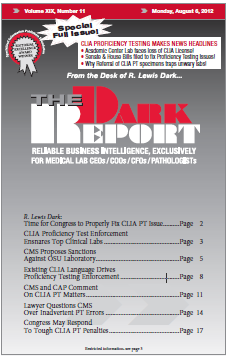CEO SUMMARY: Federal regulators rely on interpretations from administrative law judges (ALJ) for guidance in how to apply the Clinical Laboratory Improvement Amendments (CLIA) as they pertain to proficiency testing (PT) and the issue of inadvertent PT referrals. Representatives of the Centers for Medicare & Medicaid Services (CMS) and the College of American Pathologists (CAP) […]
To access this post, you must purchase The Dark Report.


